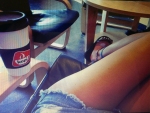So it’s safe to say that pregnancy hasn’t been anything like what I expected it to be. I’m not going to harp on about the gory details of severe morning sickness that lasts for 40 weeks because it’s very rare and most people will never experience the ‘joy’ of it, at least for that length of time. What I will focus on, is how amazing the human body is. And how little control you have over this whole amazing journey of creating a human from scratch.
In the first trimester, I lost weight. No surprises there, I was vomiting so much I was hospitalised. In the second trimester, my body really came into its own: I gained weight like a trooper, with an aim to eat as much nutritious food as I could get down and keep down, and my baby grew like a little champion. In the third trimester, the vomiting and nausea returned with a vengeance and I have been losing weight again. Remarkably, the baby continues to gain weight – proof that the human body is simply incredible in just “knowing” what to do throughout this whole process. It’s now officially “baby month” as the baby is due to arrive any day now….something which is extremely exciting and equally frustrating for a control freak like me!
WHEN is “D-Day?” Such a simple little question. Thoughts race through my head about when it could be, where I will be (hopefully not at work taking a Pilates class!), what it will be like. I can handle the excitement of not knowing the sex of our little bubba, but not knowing when it will arrive is a huge challenge for me. I feel like I’m in the final days of preparation for an Ironman, only I don’t know which day I’m actually going to have to pull it all together to perform….
Control freak aside, I know I will cope with whatever labour throws at me when the time does come; know after everything I’ve been through that I am strong enough for that. I can’t wait to become a “mother”, and to meet this little person who’s shared the toughest 9 months of my life with me.

Birthday Cake: despite my nausea, I couldn’t break my annual tradition of making myself a cake and eating some of it. It wasn’t much, but that’s a win!
What scares me is the presence of Ana, ever there perched on my shoulder and nattering away its useless voice. Every time you get weighed at the Obstetrician’s office. And you’ve lost weight. Or gained weight. Every time you think about life after pregnancy – returning to racing, eating (normally, without vomiting…), running. Breastfeeding. Every time you see your body in its ever-changing state (why aren’t there any stretch marks there? Is that even possible?!). And of course, all the unknowns about how you and your body will be afterward. I put a lot of the uncertainty down to being so sick for so long, which invariably makes you dread eating food but forcing yourself to do it anyway. In some ways, it’s like being in recovery all over again. And then when you LOSE weight despite all the effort to keep some nutrition down, it’s like an extra factor messing with your head.
I am all too aware that statistically, the postpartum period is a high risk one for ED relapse. And that those of us who have had ED’s are also at higher risk of postpartum depression and anxiety. I’m concerned that I hear the little voices of Ana already planning “when the baby is out we’ll….[insert damaging behaviour here]”. I guess I somehow thought that by being all-absorbed with the love for the little person inside of me, there would be no room left for those thoughts. I was wrong.
I feel like pregnancy does make you strong enough to fight those thoughts and do everything in your ability to nurture the child within; my question is, what happens to that force once you are no longer carrying the baby inside of your body?
My hope is that the strength will carry over. Ultimately, that little person, whether inside of me or out in the big wide world, is relying on me and only me to be its whole world – at least for the start of its life. It’s still me who has to feed it, love it, care for it. And I can’t do the best possible job of that if Ana is taking up any significant real estate in my head. I also like to tell myself that after everything I have been through in the past few years, if major relapse was going to happen, it would have happened already: if major foot surgery, 18 months away from my beloved running, and 3 miscarriages doesn’t push you over the edge I think you can stand tall and be proud of where you have gotten in your recovery.
I’m choosing to focus on my “strategies” and all the positive things to come, rather than the fear of relapse and Ana returning. Those strategies include having races pencilled in, so that I can feel like “myself” again in the not too distant future (it has been the longest time since I have raced an Ironman, fit and healthy, and I cannot wait to do it as a ‘Mum’ with my husband and baby cheering me on). And focusing on new friendships: up until this point in my life, I feel like I have friends who knew me as anorexic, then when we moved here 5 years ago, I formed a heap of new friendships with a clean slate – mostly triathlon-related friendships, and those people have no idea about how much of my life Ana took up. And I like it that way. But I have been missing spending time with a lot of those people with the reduced training that comes with surgery then pregnancy. I am excited to meet yet another bunch of friends through mother’s groups etc, and to start the next chapter in my life. I’m excited to blend that with my return to racing and hopefully have the best of both worlds: new mum, and Ironman comeback Queen. I’m blessed enough to have had a number of amazing women pave the way before me (see previous post on elite athletes and motherhood) and show me that not only can it be done, but you can actually come back even stronger.
Bring on 2015: New baby, new (stronger) body, and a long-awaited return to Ironman!
Happy Training,
K xoxo























